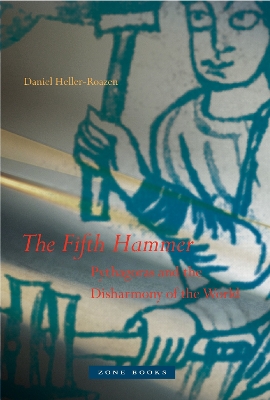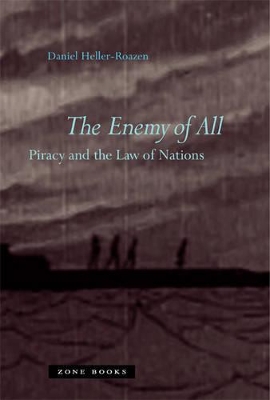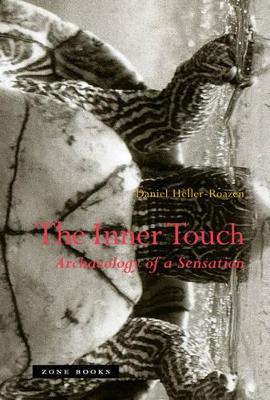Zone Books
3 total works
How the ordering of the sensible world continues to suggest a reality that no notes or letters can fully transcribe.
An ancient tradition holds that Pythagoras discovered the secrets of harmony within a forge when he came across five men hammering with five hammers, producing a wondrous sound. Four of the five hammers stood in a marvelous set of proportions, harmonizing; but there was also a fifth hammer. Pythagoras saw and heard it, but he could not measure it; nor could he understand its discordant sound. Pythagoras therefore discarded it. What was this hammer, such that Pythagoras chose so decidedly to reject it?
Since antiquity, "harmony" has been a name for more than a theory of musical sounds; it has offered a paradigm for the scientific understanding of the natural world. Nature, through harmony, has been transcribed in the ideal signs of mathematics. But, time and again, the transcription has run up against one fundamental limit: something in nature resists being written down, transcribed in a stable set of ideal elements. A fifth hammer, obstinately, continues to sound.
In eight chapters, linked together as are the tones of a single scale, The Fifth Hammer explores the sounds and echoes of that troubling percussion as they make themselves felt on the most varied of attempts to understand and represent the natural world. From music to metaphysics, aesthetics to astronomy, and from Plato and Boethius to Kepler, Leibniz, and Kant, this book explores the ways in which the ordering of the sensible world has continued to suggest a reality that no notes or letters can fully transcribe.
The philosophical genealogy of a remarkable antagonist: the pirate, the key to the contemporary paradigm of the universal foe.
The pirate is the original enemy of humankind. As Cicero famously remarked, there are certain enemies with whom one may negotiate and with whom, circumstances permitting, one may establish a truce. But there is also an enemy with whom treaties are in vain and war remains incessant. This is the pirate, considered by ancient jurists considered to be "the enemy of all." In this book, Daniel Heller-Roazen reconstructs the shifting place of the pirate in legal and political thought from the ancient to the medieval, modern, and contemporary periods presenting the philosophical genealogy of a remarkable antagonist. Today, Heller-Roazen argues, the pirate furnishes the key to the contemporary paradigm of the universal foe. This is a legal and political person of exception, neither criminal nor enemy, who inhabits an extra-territorial region. Against such a foe, states may wage extraordinary battles, policing politics and justifying military measures in the name of welfare and security. Heller-Roazen defines the piracy in the conjunction of four conditions: a region beyond territorial jurisdiction; agents who may not be identified with an established state; the collapse of the distinction between criminal and political categories; and the transformation of the concept of war. The paradigm of piracy remains in force today. Whenever we hear of regions outside the rule of law in which acts of "indiscriminate aggression" have been committed "against humanity," we must begin to recognize that these are acts of piracy. Often considered part of the distant past, the enemy of all is closer to us today than we may think. Indeed, he may never have been closer.
An original, elegant, and far-reaching philosophical inquiry into what it means to feel alive.
The Inner Touch presents the archaeology of a single sense: the sense of being sentient. Aristotle was perhaps the first to define this faculty when in his treatise On the Soul he identified a sensory power, irreducible to the five senses, by which animals perceive that they are perceiving: the simple "sense," as he wrote, "that we are seeing and hearing." After him, thinkers returned, time and again, to define and redefine this curious sensation. The classical Greek and Roman philosophers as well as the medieval Arabic, Hebrew, and Latin thinkers who followed them all investigated a power they called "the common sense," which one ancient author likened to "a kind of inner touch, by which we are able to grasp ourselves." Their many findings were not lost with the waning of the Middle Ages. From Montaigne and Francis Bacon to Locke, Leibniz, and Rousseau, from nineteenth-century psychiatry and neurology to Proust and Walter Benjamin, the writers and thinkers of the modern period have turned knowingly and unknowing to the terms of older traditions in exploring the perception that every sensitive being possesses of its life. The Inner Touch reconstructs and reconsiders the history of this perception. In twenty-five concise chapters that move freely among ancient, medieval, and modern cultures, Daniel Heller-Roazen investigates a set of exemplary phenomena that have played central roles in philosophical, literary, psychological, and medical accounts of the nature of animal existence. Here sensation and self-sensation, sleeping and waking, aesthetics and anesthetics, perception and apperception, animal nature and human nature, consciousness and unconsciousness, all acquire a new meaning. The Inner Touch proposes an original, elegant, and far-reaching philosophical inquiry into a problem that has never been more pressing: what it means to feel that one is alive.Winner of the Aldo and Jeanne Scaglione Prize for Comparative Literary Studies


